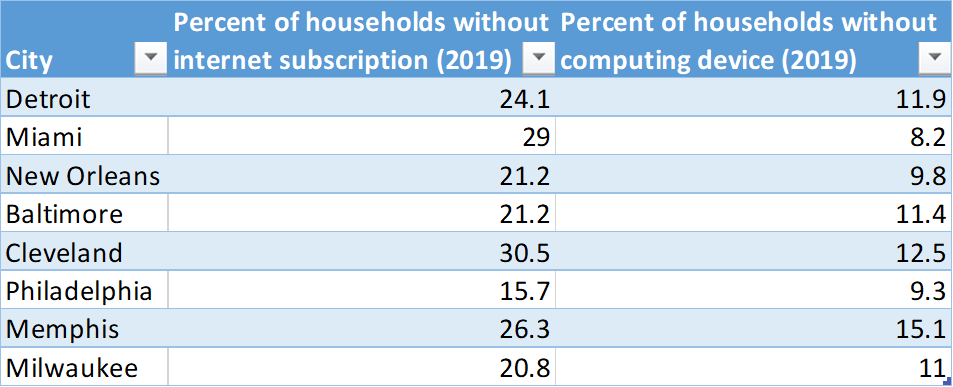How Detroit leveraged more than $27M – and Aquaman – to narrow the digital divide during a pandemic

By Lauren Slagter
DETROIT — Detroit recently added actor Jason Momoa, of Aquaman and Game of Thrones fame, to the growing list of people working to bridge the digital divide in the city.
A new video from Rocket Mortgage, a key partner in the city’s digital inclusion work, features Momoa and Joshua Edmonds, Detroit’s director of digital inclusion and a Detroit economic mobility policy fellow supported by Poverty Solutions at the University of Michigan. In the video, Momoa and Edmonds walk around the city while they discuss the need to increase access to the internet and technology among Detroiters.
“I just have a very soft spot in my heart for Detroit, so I was extremely interested in what you are doing and how I could help,” Momoa says in the video. “The goal is for all Detroit residents to have access to the internet, technology, and digital literacy information within a 10-minute walk from their homes by 2025.”
The star of our Super Bowl 54 commercial, Jason Momoa, recently paid our home city of Detroit a visit where he saw the sights and learned about our commitment to providing all residents access to internet and technology pic.twitter.com/FIGEHr8ceY
— Rocket Mortgage (@RocketMortgage) September 29, 2020
Approximately 64,280 Detroit households do not have internet access of any type. That equates to about 24% of the city’s households, according to recently-released 2019 data from the U.S. Census, and makes Detroit one of the least connected cities in the country.
Even before the COVID-19 pandemic shut down businesses, schools, and social events, a lack of internet access, computer devices, or digital skills already made it difficult for some Detroiters to fully participate in the economy, access telehealth services, take advantage of online banking, or do homework, among other things.
Now that the pandemic is restricting in-person interactions and forcing more of our lives online, the digital divide is even more pronounced.
“The pandemic just accelerated everything,” Edmonds said.
Learn more: Mapping Detroit’s digital divide
Fortunately, Edmonds spent the past year laying the groundwork for Connect 313, a citywide digital inclusion strategy that brings together numerous organizations with the goal of making Detroit a national model for digital inclusion. Building on the digital inclusion work already being done by Detroit community groups, Edmonds met with more than 520 Detroit businesses, nonprofits, community groups, government agencies, foundations, and other groups in 2019 to share his vision to increase digital equity in Detroit.
When the pandemic hit, Connect 313 was ready.
“We cut down our lag time trying to do the research, because it was already done,” Edmonds said.
That research was supported by the Detroit economic mobility policy fellows program created through Poverty Solutions’ Detroit Partnership on Economic Mobility with the city of Detroit. Edmonds is one of three fellows embedded in city departments to focus on strategic economic mobility initiatives city staff may not otherwise have the capacity to address, with the benefit of support and access to experts at U-M to guide their work.
Edmonds structured Connect 313 to focus on four aspects of digital inclusion:
- Internet access, with the goal of increasing access to low-cost residential internet, hotspot lending, and public wifi;
- Devices, with the goal of creating low-cost retail operations for local distribution;
- Digital skills, with the goal of partnering with groups to offer training on tech entrepreneurship and other tech skills; and
- Advocacy and awareness, with the goal of sharing Connect 313’s centralized partnership model as a way to leverage the resources of corporate partners, neighborhoods, and tech experts to increase digital inclusion citywide.

Percentage of households without internet access of any type in Detroit and its peer cities 2016-19, according to the American Community Survey.
These efforts are supported by a centralized Connect 313 Fund established in June and managed by United Way of Southeastern Michigan. The Rocket Mortgage Classic PGA Tour in July launched the fund with a pledge to contribute $2.1 million by the end of the year. General Motors, Quicken Loans Community Fund, and human-I-T also provided early support for Detroit’s digital inclusion strategy.
In recent months, Connect 313 also paved the way for a $23 million Connected Futures initiative to provide Detroit Public Schools Community District’s 51,000 students with computer tablets and six months of free internet access and a $1.8 million Tech Fund for Detroit Students to provide devices and internet access for charter school and private school students in Detroit.
“As new opportunities come up, we’re just activating them,” Edmonds said. “There’s still a lot of hard work ahead to improve digital equity in Detroit, but we’ve got a good foundation in place to build those efforts.”
Earlier this year, before COVID-19 made internet access even more essential, Edmonds testified on digital equity before a U.S. Congressional subcommittee. Throughout the summer, Edmonds has hosted weekly and monthly community conversations to bring together residents, the business community, and philanthropic organizations to make decisions about what’s next for Connect 313.
And through his new role on the Federal Communications Commission’s Intergovernmental Advisory Committee, Edmonds will contribute to a playbook to help other local and state governments create their own versions of Connect 313.
“I’m using every tool in the shed to legitimize everything we’re doing locally,” Edmonds said. “I want to make Detroit the national model.”

Percentage of households without internet access of any type and without a computing device of any type in Detroit and its peer cities in 2019, according to the American Communities Survey.
